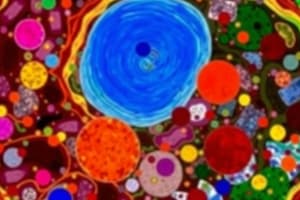Podcast
Questions and Answers
What component is found only in plant cells?
What component is found only in plant cells?
- Nucleus
- Cell Wall (correct)
- Cell Membrane
- Cytoplasm
All cells contain a true nucleus.
All cells contain a true nucleus.
False (B)
Name one primary organelle found in the cytoplasm.
Name one primary organelle found in the cytoplasm.
Mitochondria
The study of cells is known as __________.
The study of cells is known as __________.
Which of the following organisms are classified as eukaryotic?
Which of the following organisms are classified as eukaryotic?
Match the following types of cells with their characteristics:
Match the following types of cells with their characteristics:
Cytoplasm is responsible for protecting the nucleus of a cell.
Cytoplasm is responsible for protecting the nucleus of a cell.
What do all living organisms have in common regarding cells?
What do all living organisms have in common regarding cells?
What is the primary function of the cell wall?
What is the primary function of the cell wall?
The lysosome is also referred to as the 'recycling center' of the cell.
The lysosome is also referred to as the 'recycling center' of the cell.
What is the main function of mitochondria in a cell?
What is the main function of mitochondria in a cell?
The _______ is responsible for packaging proteins into vesicles.
The _______ is responsible for packaging proteins into vesicles.
Match the following cell organelles with their primary functions:
Match the following cell organelles with their primary functions:
Which organelle is known as the 'powerhouse of the cell'?
Which organelle is known as the 'powerhouse of the cell'?
The cell membrane is also known as the plasma membrane.
The cell membrane is also known as the plasma membrane.
What type of cell division results in two daughter cells?
What type of cell division results in two daughter cells?
Flashcards
Cytology
Cytology
The study of cells, the fundamental building blocks of life.
Cell
Cell
The basic unit of structure and function in living organisms.
Microscopic Cell
Microscopic Cell
A cell too small to be seen with the naked eye.
Multicellular Organism
Multicellular Organism
Signup and view all the flashcards
Plant Cell
Plant Cell
Signup and view all the flashcards
Animal Cell
Animal Cell
Signup and view all the flashcards
Prokaryotic Cell
Prokaryotic Cell
Signup and view all the flashcards
Eukaryotic Cell
Eukaryotic Cell
Signup and view all the flashcards
Cell Wall
Cell Wall
Signup and view all the flashcards
Cell Membrane
Cell Membrane
Signup and view all the flashcards
Cell Wall
Cell Wall
Signup and view all the flashcards
Cell Membrane
Cell Membrane
Signup and view all the flashcards
Cytoplasm
Cytoplasm
Signup and view all the flashcards
Endoplasmic Reticulum
Endoplasmic Reticulum
Signup and view all the flashcards
Ribosomes
Ribosomes
Signup and view all the flashcards
Golgi Complex
Golgi Complex
Signup and view all the flashcards
Mitochondria
Mitochondria
Signup and view all the flashcards
Lysosome
Lysosome
Signup and view all the flashcards
Vacuole
Vacuole
Signup and view all the flashcards
Nucleus
Nucleus
Signup and view all the flashcards
Chloroplast
Chloroplast
Signup and view all the flashcards
Cell Division
Cell Division
Signup and view all the flashcards
Study Notes
Cytology
- Cytology is the study of cells, the building blocks of living organisms
- Cells are responsible for all life processes
- Cells are categorized by size (microscopic/unicellular or macroscopic/multicellular), organism type (plant/animal), and the presence of a true nucleus (prokaryotic/eukaryotic)
- Key cell components include the cell wall, cell membrane, cytoplasm, nucleus, and various organelles (endoplasmic reticulum, ribosomes, Golgi complex, mitochondria, lysosomes, vacuoles, chloroplasts)
- Each organelle plays specific functions in cellular processes
Cell Classifications
- Size: Microscopic (small, unicellular organisms) or macroscopic (large, multicellular organisms)
- Organism type: Plant cells or animal cells.
- Presence of a true nucleus: Prokaryotic cells (no true nucleus - bacteria, archaea) or eukaryotic cells (with a true nucleus - animals, plants, fungi)
Cell Components
- Cell Wall: Found in plants, bacteria, fungi, and algae. Provides structure and protection.
- Cell Membrane: Found in all cells. Regulates what enters and exits the cell.
- Cytoplasm: A solution found in all cells, containing water, salts, and proteins.
- Nucleus: Contains the genetic material (DNA) responsible for cellular metabolism, protein synthesis, and cell division.
- Ribosomes: Synthesize proteins.
- Endoplasmic Reticulum (ER): Transportation route for proteins
- Golgi Complex: Packages proteins into vesicles
- Mitochondria: The powerhouse of the cell, producing ATP (energy)
- Lysosomes: Contain digestive enzymes for breaking down waste
- Vacuoles: Store water and food. Larger in plant cells.
- Chloroplasts: Found only in plants. Used for photosynthesis.
Cell Division
- Cell division: The process by which a parent cell divides into two or more daughter cells
- Types of cell division
- Mitosis: For cell and organism growth, repair, and replaces damaged cells; produces 2 identical daughter cells
- Meiosis: For formation of sex cells (gametes); produces 4 unique daughter cells
Studying That Suits You
Use AI to generate personalized quizzes and flashcards to suit your learning preferences.
Related Documents
Description
Explore the fascinating world of cytology, the study of cells which are fundamental to all life processes. This quiz covers the different classifications of cells based on size, organism type, and the presence of a true nucleus, as well as the key components and functions of various organelles.




